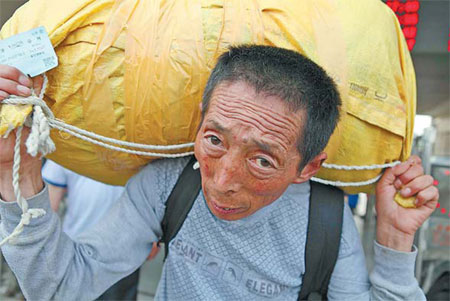Age-old question raises a retirement dilemma
 0 Comment(s)
0 Comment(s) Print
Print E-mail China Daily, June 25, 2012
E-mail China Daily, June 25, 2012
Mounting pressure
Wang isn't alone in his opposition to the proposal. A survey conducted by the People's Daily Web portal on June 11 showed that 93.3 percent of the 450,000 respondents would vote against a rise in the retirement age.
 |
|
A migrant worker carries his bag as he leaves Bozhou Railway Station in Anhui province late last month. |
In response to the mounting pressure, the ministry changed its tune on June 19, saying that a decision has been put in abeyance because more research is needed, but there is still debate about when the change should be implemented and differences of opinion remain about whether the retirement age should be raised, when it should happen and what that new age should be.
"An extension of the retirement age would be bad news for the majority of laborers. Judging by the experience of other countries, the idea always receives more support from government officials and white-collar employees than from blue-collar workers," said Tang Jun, a social policy researcher at the Chinese Academy of Social Sciences.
"For white-collar workers such as government officials, teachers, doctors, accountants and engineers, aging means experience and an accumulated advantage, but for those engaged in physically intensive labor, aging just means that work becomes harder. Those people are more vulnerable and many men lose their jobs when they reach 50, while women lose out in their 40s. Without a stable income, where will their pensions come from?" he asked.
According to Zhao Yingjie, human resources supervisor at Beijing Fulham Electronic Co, most of her company's workers are aged between 20 and 35 and only a few on the assembly lines are older than 40.
Moreover, 20 to 24 million new workers enter the labor force each year, but there are only around 10 million new jobs available, 30 percent of which are the result of natural wastage, according to Tang, who said an extension of the retirement age would definitely affect the employment prospects of young people, especially recent graduates. "If the retirement age were delayed, 3 to 4 million jobs would disappear annually," he said.
Further exacerbating the problem, young people lack the experience and expertise required to move seamlessly into the jobs vacated by their elders, said Yang Yansui, director of the research center of employment and social security at Tsinghua University.
"Young people's employment would be affected, but not on a huge scale," she said. "Instead, the government should make efforts to create jobs in the tertiary industry, which absorbs most graduates, and should also encourage young people to start their own businesses."






Go to Forum >>0 Comment(s)